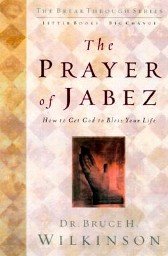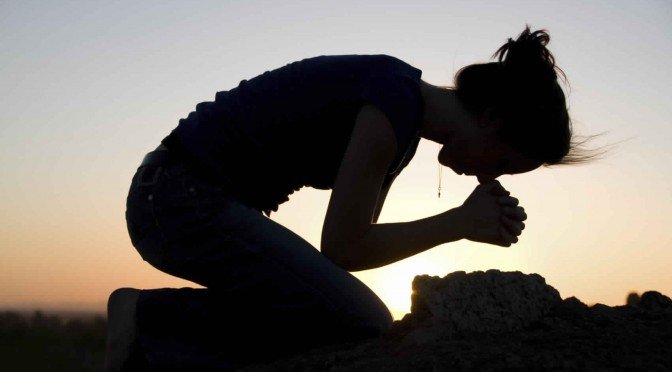As I was reminded while reading 40 Days and 40 nights, Lent, the period of the Christian year leading up to Easter, is upon us! With nearly a third of the world believing in a God and practicing some form of Christianity, I trust that many of you, my readers, are observing Lent this year. To keep in line with the spiritual nature of the season, today I will permit myself to discuss something a little more religious than usual. How about we discuss the bestselling book The Prayer of Jabez by Bruce Wilkinson? But first a quote from the Bible.
Now Jabez was more honorable than his brothers,
and his mother called his name Jabez,
saying, “Because I bore him in pain.”And Jabez called on the God of Israel saying,
“Oh, that You would bless me indeed,
and enlarge my territory,
that Your hand would be with me,
and that You would keep me from evil,
that I may not cause pain!”
So God granted him what he requested.– 1 Chronicles 4:9-10 (NKJV)
Where in the Bible Does Jabez Appear?
 If you’ve never heard of The Prayer of Jabez, or its central character Jabez, allow me to begin by sharing some background information. Jabez, a little-known Biblical figure, can only be found in the Bible in the two verses quoted above. The Bible doesn’t say much about Jabez other than that he was honorable, that he prayed to God asking for blessings, and that God granted his request.
If you’ve never heard of The Prayer of Jabez, or its central character Jabez, allow me to begin by sharing some background information. Jabez, a little-known Biblical figure, can only be found in the Bible in the two verses quoted above. The Bible doesn’t say much about Jabez other than that he was honorable, that he prayed to God asking for blessings, and that God granted his request.
What is The Prayer of Jabez?
The Prayer of Jabez, the book, is based on these same two verses from the Bible. The 92-page book, which became a #1 New York Times Bestseller in 2001, advocates praying as Jabez did, word for word, to invoke blessings upon one’s life. Although The Prayer of Jabez met with great success, it also came against a lot of criticism from some Christians.
When I first heard of The Prayer of Jabez, back in 2001 or 2002, I didn’t pay it much attention. Personally, although I pray regularly, I am not a believer in rote prayer, which is what this book seemed to me to be espousing. Also, due to its mass popularity and the fact that Jabez is such an obscure Biblical character, I imagined that this book offered a shallow seemingly-spiritual quick-fix that would appeal to the masses because of its promise of instant gratification but that held no real significance or substance.
And then, almost a decade later, a family friend lent me the book, recommending it highly. The booklover that I am had to give it a read. Frankly, I didn’t take away much from the book after a first read—as I said, I am not one for rote prayer—but neither did I find the book as heretic as I expected it to be.
Power of Prayer vs. Power of God
More recently, I came across a couple of articles that seemed to strongly condemn The Prayer of Jabez and its author. Although I found many of the arguments against the book sound, I didn’t remember drawing the same conclusions as the critics had. The critics seemed to condemn Wilkinson for promoting Jabez’s prayer above all other prayers and inciting believers (and maybe even non-believers) to forgo forging a deeper relationship with God and instead recite Jabez’s prayer, word for word, in the hopes of “cornering” God into unleashing his blessings upon them. As one article put it, The Prayer of Jabez promoted the power of prayer and not the power of God. I decided to read the book again.
 After a second read, I still found the critics unduly harsh. Although the book is about the prayer of a fairly unknown Biblical figure, I felt that the author’s purpose in writing the book was to share his own experiences with praying Jabez’s prayer and to expound on why he believed the prayer was such a good one. I did not get the impression that he was saying that Jabez’s prayer was superior to all other prayers nor that it was to be prayed in isolation. Also, although one may think that praying Jabez’s way is all about amassing wealth and other such blessings for self, I think Wilkinson did a good job in clarifying, through the examples that he gives in the book, that praying Jabez’s prayer is also about praying for more opportunity to be of service to God and a blessing to others. All in all, especially after a second read, I found this book to be a lot more substantial than I had first expected.
After a second read, I still found the critics unduly harsh. Although the book is about the prayer of a fairly unknown Biblical figure, I felt that the author’s purpose in writing the book was to share his own experiences with praying Jabez’s prayer and to expound on why he believed the prayer was such a good one. I did not get the impression that he was saying that Jabez’s prayer was superior to all other prayers nor that it was to be prayed in isolation. Also, although one may think that praying Jabez’s way is all about amassing wealth and other such blessings for self, I think Wilkinson did a good job in clarifying, through the examples that he gives in the book, that praying Jabez’s prayer is also about praying for more opportunity to be of service to God and a blessing to others. All in all, especially after a second read, I found this book to be a lot more substantial than I had first expected.
What’s Your View?
But that’s just my opinion. Have you read The Prayer of Jabez? If so, what were your thoughts about the book? How about Jabez’s prayer itself? Is this a prayer that you feel can “avail much”? Do you have any personal experiences that you would like to share about praying Jabez’s prayer? If so, I’d love to hear all about it.
That’s all for me today. To all my non-Christian readers, I apologize if you feel left out by this post. To all my Christian readers who are observing Lent this year, I wish you a deeply spiritual Lent as you contemplate a central tenet of your Christian faith.
Until the next time,
Biche
Looking for a good book to read? How about a book by Chimamanda Ngozi Adichie? Check out my review of two of her books in Chimamanda Ngozi Adichie: Americanah & Half of A Yellow Sun.
Photo Credits: jessicasimien.com; tap4him.blogspot.com

This book has been hanging around the house for so long, I will make a point of reading it. Thank you
It’s my pleasure, Tricia. And by the way, welcome to ChickAboutTown! Have you now read the book yet?
Biche
im not yet finished with the book but so far so good…im loving it and im loving my growth.
Hi Victoria,
Welcome to ChickAboutTown!
Thanks for your comment. What are you loving so much about the book, and in which ways do you feel it’s making your grow? I’d love to hear more.
Biche
What d Lord open my eyes to see is found in vs. 10 “… that I may not cause pain…” Jabez saw d future of his descendant & cry out to God to invoke His blessings in him in other to revoke generational/ancestral curse through d power of d blessing that meketh rich & added no sorrow. Is prayers are inspirational & could stir up faith.
Hi Goodluck,
Welcome to ChickAboutTown! Thanks for sharing your insight. Yes, indeed it is fundamental not to cause pain. If we all paid more attention to living this way, the world would be a vastly different–better–place.
Biche